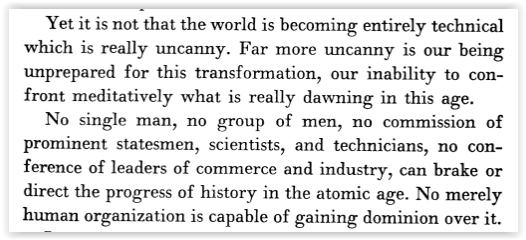
In his Discourse on Thinking Martin Heidegger foresees a radical future arising out of accelerating technology and innovation:
No one can foresee the radical changes to come. But technological advance will move faster and faster and can never be stopped. In all areas of his existence, man will be encircled ever more tightly by the forces of technology. These forces, which everywhere and every minute claim, enchain, drag along, press and impose upon man under the form of some technical contrivance or other – these forces … have moved long since beyond his will and have outgrown his capacity for decision.(51)1
Yet, it’s what he says about our inability to anticipate that bothers him most. Heidegger would see a time when no one would be able to apply the brakes to this runaway beast: social and technological acceleration (i.e., progress). (52):

Notes:
Almost every thinker past Heidegger has done much in that regard. Most under the rubric of social accelerationism (Hartmut Rosa), but the tradition from Kojve, Canguillheim, Latour, Deleuze… or especially Virilio, Virno, Steigler, etc. have their eyes on both the naturalist and artificial systems enveloped in the notions of speed and acceleration history. Most on the left have seen it as destructive, while many on the right see it within the collapse of history, etc. Even the recent work of Left Acceleration by Srnicek and Williams could be placed in a natural context as a critique of this darker side of progressive history and the need to overtake it. It’s really the old battle between technological determinism and fatalism played out against the advance of autonomous technology…. yet, in our own time it’s become more the disappearance of natural context – think of Timothy Morton’s Ecology without Nature: Rethinking Environmental Aesthetics; or, Purdy’s After Nature: A Politics for the Anthropocene; or, The Idea of Wilderness: From Prehistory to the Age of Ecology by Max Oelschlaeger; or, the works of Derrick Jensen: Endgame, Volume 1 and 2: The Problem of Civilization, Resistance. The later two seeing a need to revolt against the system of late capitlism, more in line with a neoluddite view… Benjamin Noys attacks it directly in: Malign Velocities: Accelerationism and Capitalism… Shaviro gives his critique in No Speed Limit: Three Essays on Accelerationism. One I haven’t read is The Great Acceleration: An Environmental History of the Anthropocene Since 1945 by J. R. McNeill, but it looks promising.
NNot
- Heidegger, Martin, Discourse on Thinking. Harper Torchbooks (November 19, 1969)

didn’t know that Patrik Schumacher was part of this:
http://archinect.com/news/article/134106713/introducing-liberland-an-aspirational-libertarian-micro-nation-along-the-danube
LikeLiked by 1 person
Yea, I think his Parametricism is fairly well known as a Libertarian notion…
LikeLike
news to me (was Hadid so inclined?) but makes a kind of sense.
http://www.dezeen.com/2014/03/18/architecture-not-art-patrik-schumacher-venice-architecturebiennale-rant/
LikeLike
I’ll assume she had her own view, I’ve not seen one way or the other her stance on politics. I’ve always leaned toward libertarian socialism, but it’s impractical as a world-wide system. Why? Who’ll protect the weak? Every generation bares the mark of the predator: sociopaths, psychopaths, etc. Without some form of minimal State enforcement to protect those who cannot protect themselves against the strong and aggressive ones, the violent packs and lawless, we would soon reign everywhere in a chaos of small tyrannies of thugs. So in the end the State is the Rule of the Weak against the predatory world of thugs… I guess I do have a dark view toward the world ever changing this. Obviously some would like us to believe that biotechnology through gene therapies will alleviate much of this, but where will that lead? I think we need our imperfections, our eccentrics, our wild ones and excessive ones in the world. Without it we’d soon live in a very robotic society where everyone is happy, living out their lives on some form of biopharma or biotech therapy. When I listen to Arran I feel he is seeking just that with his move toward Stoicism… the alleviation of pain, etc. To do that would leave us vulnerable to the Outside and unknown forces we have yet to recon with…
LikeLike
From Ernst Robert Curtius’s letter to Friedrich Gundolf (November, 1914):
What is horrifying about modern war is that human beings do not fight against other human beings, but against gruesome impersonal machines. Land mines, machine guns, artillery fire: that is the anonymous horror on which every idealistic perception of the war must founder. (quoted from Robert E. Norton, Secret Germany: Stefan George and His Circle, [Cornell University Press, 2002], p. 530)
LikeLiked by 1 person